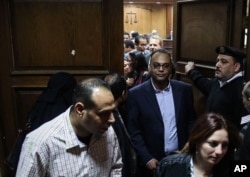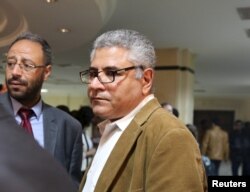An investigation into two prominent Egyptian activists has renewed concerns about the ability of human rights groups to operate under the current government.
Hossam Bahgat, founder of the Egyptian Initiative for Personal Rights, and Gamal Eid, founder of the Arab Network for Human Rights Information, are banned from traveling abroad or accessing their assets until an April 20 hearing that will help decide if they illegally accepted foreign funding.
If found guilty, they could face up to 25 years in prison. Non-governmental organizations in Egypt are allowed to take foreign funding, but cannot use the funds for activities that undermine security.
Activists say the case against the two men is part of a renewed effort by Egyptian authorities to limit civil society. Six of Egypt's leading human rights groups face investigation and 13 NGOs said the government has questioned their workers and attempted to freeze their assets.
Restrictions on NGO operations in Egypt date back decades, but there was a renewed effort after the 2013 takeover by President Abdel-Fattah el-Sissi. The government faces security pressures from the Islamic State, as well as economic pressures after years of unrest since the 2011 Arab Spring revolution.
The minister who oversees NGOs in Egypt declined comment. In a Thursday statement, the Egyptian foreign ministry said "more than 47,000 NGO's are working in Egypt, including nearly 100 foreign NGOs who are operating freely in many fields."
U.N. High Commissioner for Human Rights Zeid Ra-ad Al Hussein said, "NGOs who have played a valuable role in documenting violations and supporting victims will see their activities completely crippled if this continues."
Growing pressure for U.S. to respond
The latest round of crackdowns has prompted the Egypt Working Group, a bi-partisan effort by Washington, D.C., scholars and analysts who follow Egypt, to call for action from U.S. President Barack Obama.
In a March 23 letter, the group urges Obama to "make crystal clear to the Egyptian president that continued assaults on civil society, including harassment of U.S. organizations, will make it difficult to cooperate across a range of issues."
The Egyptian Foreign Ministry has criticized the Egypt Working Group in the past, saying it aims to "spread chaos in the Middle East."
Brian Katulis, a senior fellow at the Center for American Progress and a member of the working group, said the crackdown is due to insecurity on the part of the Egyptian government.
"Any time in Egypt we've seen a government that doesn't perform well and feels insecure about its own performance, it sometimes takes very aggressive measures to squelch debate and criticism," he said.
Katulis says the recent crackdown is one of the most extreme periods in the history of government intimidation of NGOs. He sees the case against Bahgat and Eid as one example of the problems facing NGOs in Egypt and part of "a broader shortcoming in U.S. policy which has not consistently elevated human rights on its list of concerns in a serious way."






